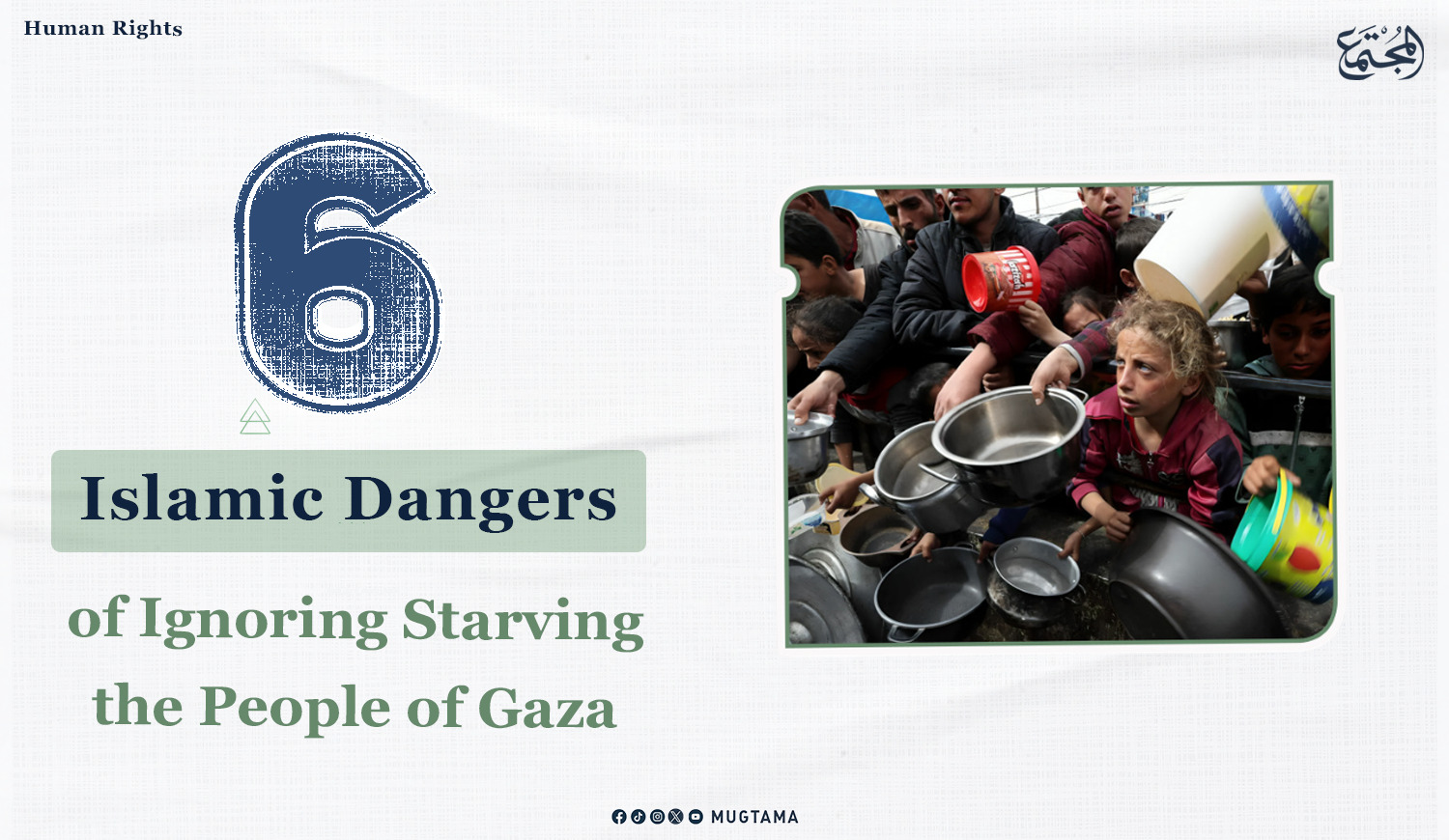Consequences of Complicity
6 Islamic Dangers of Ignoring Starving the People of Gaza

In wars, rifles are raised, rockets are launched, and homes are destroyed. But in Gaza, bread is used as a weapon, water is cut off to break spirits, and children are besieged until they starve! This is a different kind of war – a war on empty stomachs, not on armed forces. Therefore, starving the people of Gaza is not just a humanitarian violation, but a grave Islamic sin.
Here are the most significant Islamic
dangers resulting from the starvation of the people of Gaza:
1.
Deficiency in Faith
Al-Tabarani narrated in "Al-Mu'jam
al-Kabir" from Anas ibn Malik who said: The Messenger of Allah (peace be
upon him) said: "He has not believed in me who goes to bed sated while his
neighbor is hungry beside him, and he knows it." Faith is deficient if a
Muslim abandons their brothers and fellow believers, leaving them to their
enemy without support or aid.
2. Bearing
the Sin of Abandonment
Silence regarding the starvation of
the people of Gaza and not providing them with relief is a form of abandonment,
which is Islamically forbidden. Believers are brothers, and a brother does not
abandon his brother. In Sahih Muslim, Abu Hurairah narrated that the Messenger
of Allah (peace be upon him) said: "A Muslim is the brother of a Muslim;
he does not wrong him, nor does he abandon him."
In Sahih al-Bukhari, Abdullah ibn Umar
narrated that the Messenger of Allah (peace be upon him) said: "A Muslim
is the brother of a Muslim. He does not oppress him, nor does he hand him over.
Whoever fulfills the needs of his brother, Allah will fulfill his needs.
Whoever relieves a Muslim of a difficulty, Allah will relieve him of a
difficulty on the Day of Resurrection. And whoever covers a Muslim's fault,
Allah will cover his fault on the Day of Resurrection."
3.
Participation in the Sin of Siege
Not providing aid to the people of
Gaza and letting them die of hunger is a form of participation in the siege,
which is a great sin. Any person capable of aiding them who deliberately
deprives them is considered to be loyal to their enemy. Allah (the Exalted and
Most High) warned against taking disbelievers as allies instead of believers,
as He said: "O you who have believed, do
not take the disbelievers as allies instead of the believers."
(An-Nisa: 144). And He (the Exalted) said: "O
you who have believed, do not take the Jews and the Christians as allies. Some
of them are allies of one another. And whoever of you takes them as allies,
indeed, he is one of them. Indeed, Allah guides not the wrongdoing
people." (Al-Ma'idah: 51).
4.
Cooperation in Sin and Aggression
Allah (the Exalted and Most High)
commanded His servants to cooperate in righteousness and piety. Muslims
cooperate to feed their hungry, care for their poor and needy, and assist those
in need. However, leaving the Mujahideen and their families in hunger and
thirst is among the most severe and difficult situations where a Muslim
cooperates with their enemy, even if they don't realize it. This is cooperation
in sin and aggression. Allah (the Exalted) says: "And
cooperate in righteousness and piety, but do not cooperate in sin and
aggression. And fear Allah; indeed, Allah is severe in penalty." (Al-Ma'idah: 2). Starvation, siege, and
deprivation of food and medicine are all forms of aggression forbidden by
Islamic law; indeed, they are forms of slow killing.
5. Exposing
the Ummah to Collective Punishment
Some people claim that a Muslim is
responsible only for themselves and has no relation to other Muslims, being
accountable only for their own actions. They use this as an excuse not to
support or aid others. In Musnad Ahmad, Qais ibn Abi Hazim narrated from Abu
Bakr Al-Siddiq, who said: "O people, you recite this verse: 'O you who have believed, upon you is [the responsibility
for] yourselves. Those who have gone astray will not harm you when you have
been guided.' (Al-Ma'idah: 105).
And I heard the Messenger of Allah (peace be upon him) say: 'Indeed, if people
see an oppressor and do not restrain his hand, Allah will soon inflict His
punishment upon all of them.'"
Allah (the Exalted) says: "And fear a trial which will not strike those
who have wronged among you exclusively, and know that Allah is severe in
penalty." (Al-Anfal: 25). The occurrence of a group of Muslims
engaging in sins and oppression, and its widespread prevalence, is indeed a
path to the generalization of punishment upon all people.
6. Hunger
May Lead to Disbelief
Hunger is one of the most dangerous
afflictions a person can face. The Prophet (peace be upon him) sought refuge
from it. In Sunan Abi Dawud, with a chain of narration graded good by
Al-Albani, Abu Hurairah narrated that the Messenger of Allah (peace be upon
him) used to say: "O Allah, I seek refuge in You from hunger, for it is
indeed a wretched companion."
Hunger is a sign of poverty and
deprivation, and poverty can drag a person to compromise their principles and
religion if their faith is weak. This is why the Prophet (peace be upon him)
sought refuge in Allah from it. In Musnad Ahmad, with a good chain of
narration, Muslim ibn Abi Bakra narrated from his father that the Prophet
(peace be upon him) used to say: "O Allah, I seek refuge in You from
disbelief, poverty, and the torment of the grave." This means it may
nearly lead to disbelief because it encourages dissatisfaction with divine
decree and resentment towards sustenance, which can lead to disbelief, and we
seek refuge in Allah from that. (1)
------------
(1) Al-Fath Al-Rabbani li Tartib Musnad Al-Imam Ahmad ibn Hanbal Al-Shaibani (4/63).










